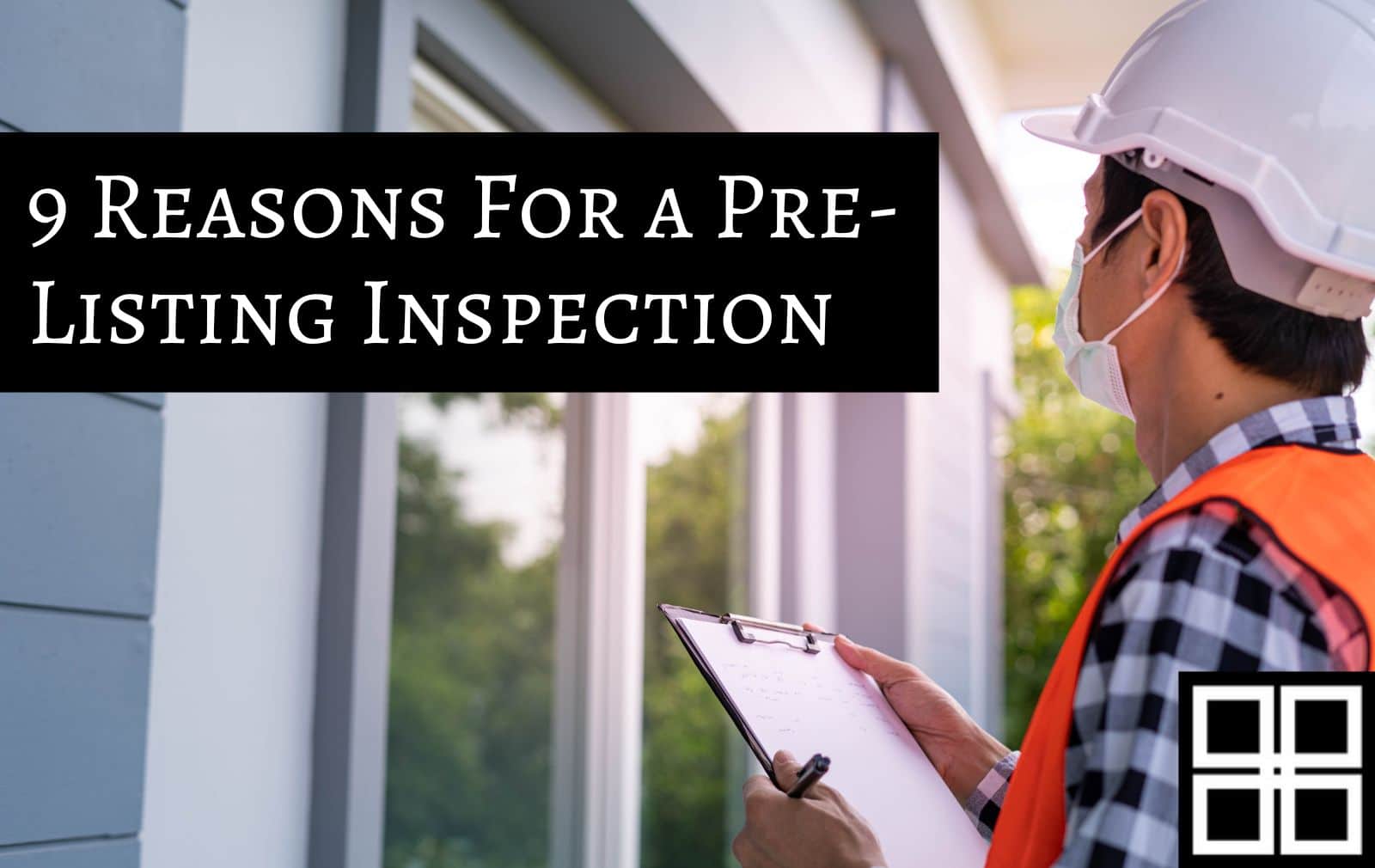9 Reason to Get a Pre-Listing Inspection
In a typical real estate transaction the buyer will order the home inspection. Sellers can also request an assessment by a professional before listing their property. Pre-listing inspections give sellers more information upfront about their property’s condition, allowing them to make repairs with greater control and possibly strengthen their negotiating position.
Pre-listing inspections are one of many things a seller can do to help their home sell more quickly and gain the trust of buyers and agents.
But first of all…..
What is a pre-listing inspection?
A pre-listing inspection is a home inspection that is done by the seller before listing their home on the market.
This information can help sellers to begin the home selling process. It gives them the opportunity to control the repairs and price of their house more accurately.
The inspection is similar to any other home inspection. The inspector will examine each component and system to make sure that they are working properly and there are no major issues.
Benefits of pre-listing inspections
Some may think that a pre-listing inspector is not necessary, but there are many good reasons for sellers to get one. Pre-listing inspections are becoming more popular among homeowners.
1. Understand the condition of your home
A professional home inspector can provide you with the most accurate assessment of the state of your house. If you are a seller, a pre-listing home inspection will provide you with important information as you prepare to list your house. It’s best to find out about major defects sooner than later.
It is not uncommon for buyers to back out of a deal due to issues that are discovered during the inspection. It is for this reason that sellers are now getting their own inspections. They can fix these problems or adjust the price of the house if they are aware.
Pre-listing inspections reduce the chance that the buyer will find hidden defects in the property and back out of the sale.
2. Repairs can be done in advance
You should discuss with your agent any minor or significant issues that were discovered during the inspection. Together, you can decide which ones should be fixed before listing, and which ones should be disclosed to potential buyers. If you as the seller decide to make some home upgrades or repairs prior to listing, you will have ample time to find contractors and compare prices. You can save time, money and stress by taking control of the projects.
When a buyer’s home inspector discovers these defects, the buyer may want their own contractor to fix them, on the seller’s dime. Often, contractors are hired at higher prices than they should be for preferences the buyer has that may not be necessary.
On the other hand, it is best to leave some repairs up to the discretion of the buyer. In some cases, it is not essential for the sale to be successful. The new owner may also want to control the repairs to suit their needs. Work with your agent again to determine the best plan of action for your situation in order to prepare your home for sale.
3. Price your home accurately
It’s difficult to choose the right price for your home to be listed on the market. It’s important to not scare off potential buyers with a price that’s too high. But you also don’t want to lose money by setting a price too low. You can get as close as possible to a sweet spot by working with your listing agent and using the pre-listing report. You can also use the inspection report as a way to justify your listing price.
4. Avoid a buyer home inspection
The buyer may decide to forgo their own inspection if the home inspector does not find any defects that are significant during the inspection.
This will not only save the buyer time, but also money. Both buying and selling a house can be a long process. Anything that can accelerate this process will benefit both parties.
Listings that state that a home has been inspected may make it more appealing to buyers than those who don’t. Buyers can still opt to do their own inspection but they can compare it to that of the seller. They will be able to purchase the house with complete peace of mind and they may not counter-offer the price when negotiating.
5. Ability to compare results
A seller has a great advantage by getting a pre-listing inspector to inspect the property. They can compare the results. The two different inspection reports can be compared if, for example, the buyer decides to do their own inspection of the home and finds that it has many more defects.
Sellers can ask their inspector to come out again and check the defects that the buyer’s inspector reported. This will allow them to verify whether they missed the defects or if the inspector was dishonest. This doesn’t happen often, but it can save a seller money on negotiation costs if defects aren’t as bad as the buyer’s inspector reported.

6. Earn credibility and trust
This is a good reason that sellers are now getting pre-listing home inspections. They want to build rapport with potential buyers. It is important that the buyer has trust in you and your agent if you want to sell a house quickly.
A house is an important investment and one of the biggest purchases people make in their lifetime. Most buyers take their time and are very careful when purchasing a home.
Buyers want to feel secure and safe in their decision to buy your home. Sellers who gain the buyers’ trust will have an advantage.
7. Better marketing
You can also use the report of the pre-listing home inspection to highlight the positive aspects that were discovered during the inspection. The inspection report may show that the roof has many years remaining and is in great condition. You can use this information to highlight it on the listing. Share the results of your pre-listing home inspection with potential buyers to help build trust.
8. Attract serious buyers
Most listings may have buyers who are skeptical of the condition of the house and don’t want to be stuck with an expensive money pit. By sharing the results of the inspection before listing, sellers will attract serious buyers that are aware of the issues associated with the ownership of the house. Information provided to the buyer will help to remove any doubts they may have about the property. Their interest in the house is also a sign of their desire to continue the process.
9. Less negotiations
You can avoid the common negotiation that follows when the buyer has their home inspected. Many of these negotiations revolve around fixing the issues found by the inspector. You will be able to account for your home’s condition with a pre-listing inspector and work together with your real estate agent on the disclosures. Both the buyer and the seller will benefit from having the information up front. This helps them stay on the same page throughout the entire transaction. If the buyer’s inspection reveals any new problems, you can compare your inspection report and call the inspector that did the pre-listing to have another consultation.
Q&As for pre-listing inspection
If you’re still wondering, “should I get a pre-listing home inspection”, these questions and answers should help make your decision just a little bit easier.
What are the differences between a pre-listing inspection and a buyers inspection?
The scope of the inspection is the same. The only difference is the person who will be having the home inspected. In this case, it’s the seller instead of the buyer. The seller is doing a thorough inspection to understand the state of the home before the buyer inspects it.

What is the average cost of a pre-listing home inspection?
It is the same fee as for a buyer’s inspector, which can range from $350 up to $500. The price will vary depending on the location, the square footage of the house, its age, and any other special conditions.
Why should the seller perform an inspection if the buyer will be doing one anyway?
A pre-listing home inspection is valuable to sellers because it allows them to be aware of any issues before negotiating a sale agreement. This gives them time to fix them or include them in the price. The seller has more control over the marketing of their home, and can reduce stress during negotiations. Pre-listing home inspections help homes sell quicker and with fewer inspection issues, which makes for a smoother sale.
What comfort can a buyer get if the seller refuses to pay for repairs?
The value of receiving inspection information is both tangible and emotionally rewarding for many buyers. The buyer is made aware of any issues that are identified in the report. This gives him more information to work with. Buyers are better informed when sellers disclose issues prior to listing.
Is it a waste of money to get a pre-listing home inspection?
In reality, a pre-listing inspection will save sellers money in two different ways. By being upfront and revealing known property problems, the seller is able to make it clear that the consideration for these items has been included in the sale price. This effectively removes these issues from the negotiation table. The seller may also choose to fix the problems before listing them, giving him more control over the repair costs.
Should a seller give a buyer the full pre-listing report or only the summary?
This is something that sellers should discuss with their agent. It is fair to say that the industry has evolved so much that the summary of an inspection should contain all the information you need to know. The summary should achieve the goal of transparency and awareness. I can understand how a good-faith effort to provide more detail, depending on the complexity and length of the report as well as technical complexity, could cause alarm for the buyer if they don’t know what the information means. Remember that the full report can also provide positive confirmation of the functionality of major components and systems in the home.










